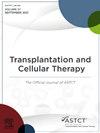Efficacy of a Modified Post-Transplant Cyclophosphamide Regimen for Unrelated Donor Hematopoietic Stem Cell Transplantation in Patients with Severe Aplastic Anemia: A Prospective Study
IF 3.6
3区 医学
Q2 HEMATOLOGY
引用次数: 0
Abstract
The aim of the present study was to examine the efficacy of the modified post-transplant cyclophosphamide (PTCy) regimen, which involved reducing the Cy dose to 40 mg on days +3 and +4 in patients with severe aplastic anemia (SAA) subjected to unrelated donor allogeneic hematopoietic stem cell transplantation (URD-HSCT). For this purpose, a prospective single-center trial was conducted and the clinical outcomes were collected from 30 patients with SAA treated with the modified PTCy regimen for URD-HSCT. The median time to neutrophil and platelet engraftment was 13 days (range, 11 to 16) and 12 days (range, 5 to 33), respectively. The cumulative incidence of neutrophil and platelet engraftment was 93.1% ± 0.3% and 96.6% ± 0.2%, respectively. The 2-year overall survival (OS) was 97% (95% confidence interval [CI]: 90%-100%] and 2-year graft-versus-host disease (GVHD) and rejection-free survival (GRFS) was 93% (95% CI: 85%-100%). The incidence rates of acute GVHD (aGVHD) and chronic GVHD (cGVHD) were 13.8 ± 0.4% and 10.3 ± 0.3%, respectively, and no patients developed grades III-IV aGVHD. However, only one patient developed a moderate extensive cGVHD. The incidence of reconstitution varies among different subsets of immune cells after URD-HSCT. Natural killer (NK) cells recover first, followed by CD8+ T and CD19+ B cells, and finally CD4+ T cells. In conclusion, the present study demonstrates that the modified PTCy regimen, with a reduced dose of 40 mg on days +3 and +4, may be an effective regimen for URD-HSCT in patients with SAA and reduce the occurrence of the GVHD.
重型再生障碍性贫血患者移植后改良环磷酰胺治疗方案的疗效:前瞻性研究。
本研究旨在探讨移植后环磷酰胺(PTCy)改良方案的疗效,该方案将Cy剂量降至40毫克(第+3和+4天),适用于接受非亲缘供体异基因造血干细胞移植(URD-HSCT)的重型再生障碍性贫血(SAA)患者。为此,我们进行了一项前瞻性单中心试验,收集了30名接受改良PTCy方案治疗的重型再生障碍性贫血患者的临床结果。中性粒细胞和血小板移植的中位时间分别为13天(11至16天)和12天(5至33天)。中性粒细胞和血小板移植的累积发生率分别为93.1±0.3%和96.6±0.2%。2年总生存率(OS)为97%[95%置信区间(CI):90%-100%],2年移植物抗宿主病(GVHD)和无排斥生存率(GRFS)为93%(95% CI:85%-100%)。急性移植物抗宿主疾病(aGVHD)和慢性移植物抗宿主疾病(cGVHD)的发生率分别为(13.8±0.4)%和(10.3±0.3)%,没有患者发生III-IV级aGVHD。不过,只有一名患者出现中度广泛cGVHD。尿毒症造血干细胞移植后,不同免疫细胞亚群的重建发生率各不相同。自然杀伤细胞(NK)首先恢复,其次是CD8+ T细胞和CD19+ B细胞,最后是CD4+ T细胞。总之,本研究表明,在第 +3 和 +4 天减量使用 40 毫克的改良 PTCy 方案可能是治疗 SAA 患者 URD 造血干细胞移植的有效方案,并能减少 GVHD 的发生。
本文章由计算机程序翻译,如有差异,请以英文原文为准。
求助全文
约1分钟内获得全文
求助全文
来源期刊

Transplantation and Cellular Therapy
Medicine-Hematology
CiteScore
7.00
自引率
15.60%
发文量
1061
审稿时长
51 days
 求助内容:
求助内容: 应助结果提醒方式:
应助结果提醒方式:


